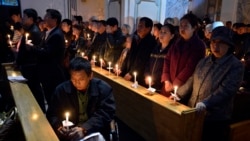“The constitution [of the People’s Republic of China] states that Chinese citizens enjoy ‘freedom of religious belief’ but limits protections for religious practice to ‘normal religious activities,’” said the recently released U.S. State Department’s Annual Report on International Religious Freedom for the year 2012.
The [Chinese] government defines “freedom of religious belief in a manner that does not meet international human rights standards for freedom of religion and routinely enforces other laws that restrict religious freedom.”
“The [Chinese] constitution also proclaims the right of citizens to believe in or not believe in any religion,” the Report said. “However, only religious groups belonging to one of the five state-sanctioned “patriotic religious associations” [defined by the Chinese government as] Buddhist, Taoist, Muslim, Roman Catholic, and Protestant, are permitted to register with the government and legally hold worship services.”
The Chinese government’s respect for religious freedom declined during the year 2012, particularly in Tibetan areas and the Xinjiang Uighur Autonomous Region.
“The [Chinese] government emphasized state control over religion and restricted the activities and personal freedom of religious adherents when these were perceived, even potentially, to threaten state or Chinese Communist Party interests, including social stability,” the Report continued. “Local authorities often pressured unaffiliated religious believers to affiliate with patriotic associations and used a variety of means, including administrative detention, to punish members of unregistered religious or spiritual groups.”
One potential sign of progress in the area of religious freedom is that in February, 2012, China’s State Administration of Religious Affairs published an opinion supporting religious organizations’ involvement in disaster relief and social service activities, “ostensibly opening new avenues for faith-based organizations to provide aid to the public,” the Report said.
“U.S. officials consistently urged the [Chinese] government to adhere to internationally recognized rights of religious freedom, protested abuses of religious freedom, acknowledged positive trends, and met with members of religious communities, including those being persecuted for their beliefs,” the Annual Report on International Religious Freedom said.
Promoting greater respect for human rights is among the United States’ top foreign policy objectives, including in our relations with China. The United States continues to urge respect for the universal right to freedom of religion for all people, including those in China who are affiliated with religious groups that are not officially recognized by the Chinese government.
The [Chinese] government defines “freedom of religious belief in a manner that does not meet international human rights standards for freedom of religion and routinely enforces other laws that restrict religious freedom.”
“The [Chinese] constitution also proclaims the right of citizens to believe in or not believe in any religion,” the Report said. “However, only religious groups belonging to one of the five state-sanctioned “patriotic religious associations” [defined by the Chinese government as] Buddhist, Taoist, Muslim, Roman Catholic, and Protestant, are permitted to register with the government and legally hold worship services.”
The Chinese government’s respect for religious freedom declined during the year 2012, particularly in Tibetan areas and the Xinjiang Uighur Autonomous Region.
“The [Chinese] government emphasized state control over religion and restricted the activities and personal freedom of religious adherents when these were perceived, even potentially, to threaten state or Chinese Communist Party interests, including social stability,” the Report continued. “Local authorities often pressured unaffiliated religious believers to affiliate with patriotic associations and used a variety of means, including administrative detention, to punish members of unregistered religious or spiritual groups.”
One potential sign of progress in the area of religious freedom is that in February, 2012, China’s State Administration of Religious Affairs published an opinion supporting religious organizations’ involvement in disaster relief and social service activities, “ostensibly opening new avenues for faith-based organizations to provide aid to the public,” the Report said.
“U.S. officials consistently urged the [Chinese] government to adhere to internationally recognized rights of religious freedom, protested abuses of religious freedom, acknowledged positive trends, and met with members of religious communities, including those being persecuted for their beliefs,” the Annual Report on International Religious Freedom said.
Promoting greater respect for human rights is among the United States’ top foreign policy objectives, including in our relations with China. The United States continues to urge respect for the universal right to freedom of religion for all people, including those in China who are affiliated with religious groups that are not officially recognized by the Chinese government.






